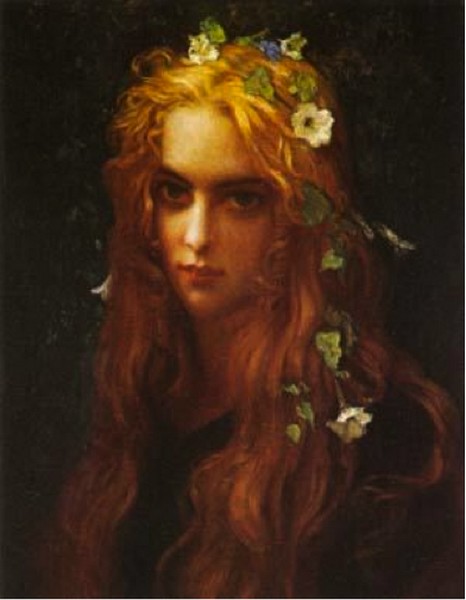
I'm not thinking of stablishing 14th February as "Ophelia's Day" on Liedarabend, but I jotted down some Ophelia's songs in my notebook and we’ve only heard, so far, those of Brahms (last year, at the very same period) and Strauss (some weeks later). So, this week we're talking about Ophelia and Moniuszko, no matter the song doesn't talk exactly about Valentine's Day.
Stanisław Moniuszko is considered the father of Polish national opera; pieces such as Halka or Straszny Dwór (The Haunted House) made his name known beyond the Slavic countries. He's also considered the liaison between the most international figure in Polish music, Frédéric Chopin, and the greatest name of the 20th century, Karol Szimanovski. To set the context, Moniuszko lived between 1819 and 1872; It was, therefore, nine years younger than Chopin (and also, than the whole first generation of Romantic composers born around that year: Liszt, Schumann, Mendelssohn or Wagner) and died ten years before Szimanowski was born.
Born in Ubiel (today in Belarus), his family moved to Warsaw years later. The young Stanisław completed his musical education in Germany and when he came back three years later, in 1840, he settled in Vilnius, where he taught music (as well as composing, naturally), before he settled again in Warsaw. He travelled often along Europe, being in touch with many of his colleagues in Germany, France or Russia. From 1858 and for fifteen years, he directed the Warsaw Opera, being always conditioned (as the whole country was) by their political circumstances and watched closely by the censorship imposed by Russia.
In addition to opera and operetta, he virtually cultivated all genres: ballets, sacred, symphonic, incidental or chamber music, solo piano and, naturally, songs. He wrote his first ones in 1848, shortly after arriving at Berlin; There were three songs with poems by the most important Polish poet of the time, Adam Mickiewicz, and they were published by the famous editors Bote & Bock, with good reception among critics. He wrote his last songs the year he died, and, all in all, they add up to more than three hundred. In 1843, he published a collection of eighteen songs with the title Spiewnik Domowy (Songbook for Home Use). He explained in an article that he did his best to choose the best poets, and hoped that the collection would be of some interest for his readers:
"Because if beautiful poetry with beautiful music can find their way to the ears and hearts of the least musical people, then even inferior music that is less felicitous, when added to perfect poetry will find a tolerant listener; whatever is national, domestic, local, an echo of our childhood memories, will never cease to win favour with the residents of the land where they were born and bred. This is the inspiration by which I wrote these songs, which though they contain different kinds of music, still have a national purpose and character."
.He published twelve volumes until 1859; in total, 267 songs. As the composer remarks in those lines, most of the poets he chose were Polish, but there were also some French, German or English (such as Shakespeare) ones; Music is often inspired by folklore, but some songs find inspiration in religious music or German Romanticism. Moniuszko wanted his songs to be performed at home, by non-professional musicians; the musical language is often simple and there are some pieces specially devoted to children.
We’ve heard so far, enough songs to unsderstand that talking about "a simple song" is not at all derogatory; it can be as beautiful as our song today, Piosnka obłąkanej Ofelii (which could be translated by Song of the mad Ophelia); "just" a charming melody is needed, subtly underlined by some chords at the first stanza and the triplets at the second.
Moniuszko chose, in the Polish translation of Krystyn Ostrowski, four of the verses that Ophelia sings in her delirium at the beginning of scene V in the fourth act, immediately before of those we heard in Brahms and Strauss' songs. Today, the performers of Piosnka obłąkanej Ofelii are Olga Maroszek and Elżbieta Tyszecka.
Któz mi powie, cni druzbowie, gdzie kochanek mój?
Kij, sandały, z konch na głowie, ach, to dziwny strój!...
W zycia wiośnie nielitośnie opuścił nas;
tam mu nad czołem trawa rośnie, a u stóp zimny głaz! zimny głaz.
Śniezne włosy wieńczą wrzosy, głóg i zwiędły bez;
płaczcie nad nim wonne rosy, bo juz nie mam łez.
Juz nad skronią piasek ronią. Panie! Duszy jego świeć!
W raj ulata z kwiatów wonią. Leć, gołąbku! Leć tam, leć!
How should I your true love know
From another one?
By his cockle hat and staff,
And his sandal shoon.
He is dead and gone, lady,
He is dead and gone;
At his head a grass green turf,
At his heels a stone.
White his shroud as the mountain snow,
Larded with sweet flowers;
Which bewept to the grave did go
With true-love showers.
His beard was as white as snow,
All flaxen was his poll;
He is gone,
And we cast away moan:
God ha' mercy on his soul.